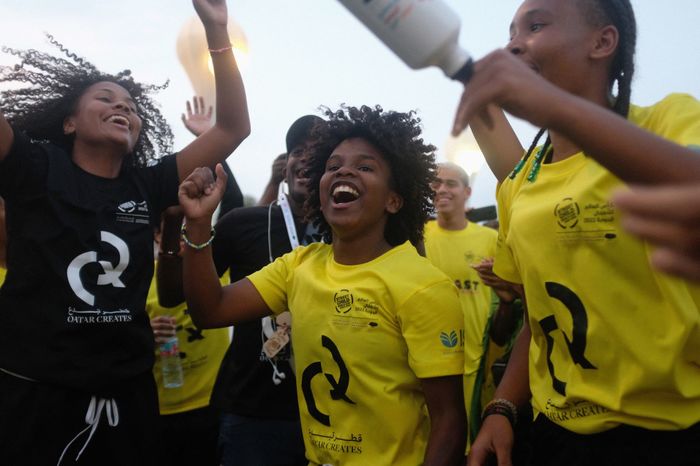‘Humanising Cambridge’ through the camera
Heidi Atkins talks to Tirza Sey about her upcoming documentary Cam Uncut and its mission to shine a light on all parts of life in Cambridge

For most people entering the final year of their degree, the thought of adding any extra work onto the already intense workload sounds horrific. But, for third year lawyer Tirza Sey , the last stretch of her degree sounded like the perfect time to undertake the behemoth task of presenting a ‘true Cambridge’ through a 15 episode investigative docu-series into race, class, and culture at Cambridge. Supporting the project are are creative directors Ollie Gottlieb and Annissa La Touche. I caught up with Tirza to find out her motivations, aims, and plans for her documentary, Cam Uncut.
"It took me a long time to realise, that black is truly beautiful, even if this place doesn’t validate that"
The documentary is split into three segments – race, class, and culture – and Tirza aims to complete one per term, releasing them slowly over the holidays. Each segment will have 5-7 episodes, focusing on a different aspect of the three broader segments, and will contain interviews with students about their experiences at this university. Tirza gives me a preview of an episode called Invited But Not Accepted, which will contain interviews with people about “the invisible barrier” many people of colour feel entering spaces in Cambridge. She tells me about her experience of rowing: “no one ever did anything to make me feel out of place but there was this tangible feeling that if you’ve never rowed before, if you’re not from the same background, you’re not going to fit in.”
“I’m from a working class single-mother household. My mum was in care growing up so she struggled to get to school. I’m incredibly proud that in one generation we’ve gone from not going to school to going to Cambridge,” Tirza explains when I ask about her background, she is quick to emphasise that “this is not a piece solely from the eyes of a working class black girl, but from as many people as possible.” Her desire to generate diverse perspectives has led to her hiring second year Ollie Gottlieb as assistant creative director. “Aside from his passion for this project, I purposefully chose Ollie because of how different our experiences have been at this university. We will never see Cambridge through the same lens, but as experiences teach us different lessons, we can learn from each other. I think that’s a beautiful thing, really.”

Tirza’s commitment to a diversity of experience is palpable, and a huge part of what sets this project apart from other exposés of Cambridge. “We’re not running into drinking societies with a GoPro strapped to our heads,” she tells me, keen to emphasise just how anti-sensationalism this project is, “we’re looking at lived experiences and coming at it from all angles.” Her aim is to “sit down and talk with people,” the vision being, not to sensationalise life here, but to humanise Cambridge.
“Change starts with people, and I want people from different backgrounds to come here and pioneer to change the institution”
One of the ways Tirza hopes to break down the veneer of perfection she felt during her first two years is by discussing things often treated as too uncomfortable. “In first year I felt like my blackness was such an obstacle, such a barrier. I remember crying, confused as to why my colour was such an issue to some people. It forced me to hate something so intrinsic to my identity, something I never felt conscious of before coming here. It took me a long time to realise, that black is truly beautiful, even if this place doesn’t validate that.” Her journey towards self love was helped by talking to “other women of colour who’ve felt the same,” and she hopes Cam Uncut will help people who have struggled through similar problems.
Through talking to as many people as possible, Tirza wants to make sure newcomers to Cambridge know that there are people here who will represent them. She bemoans the fact she was made to feel she wasn’t supposed to be here: “I got the grades, I did the LNAT, I did the CLT. In terms of class, in terms of race, in terms of background, I was made to feel like I didn’t belong. I have gotten here despite the obstacles and I don’t want people to feel like they cannot take up space here.”
Cam Uncut is a documentary about protest, about people taking up spaces where they are made to feel they don’t belong and, critically, about self love. “I always want people who are in the same positions as me or come from marginalised backgrounds to apply to Cambridge because it’s an act of protest.” As the interview comes to an end, Tirza says that “change starts with people, and I want people from different backgrounds to come here and pioneer to change the institution. I want people to know that it may not be easy, but that’s okay.”
 News / Uni to ‘review’ tripos rankings and weekend lectures in undergrad teaching overhaul10 April 2025
News / Uni to ‘review’ tripos rankings and weekend lectures in undergrad teaching overhaul10 April 2025 News / Rowing row continues as Oxford and Cambridge scrap women’s trial race9 April 2025
News / Rowing row continues as Oxford and Cambridge scrap women’s trial race9 April 2025 News / PETA urges Cambridge dictionary to change ‘derogatory’ rat definition11 April 2025
News / PETA urges Cambridge dictionary to change ‘derogatory’ rat definition11 April 2025 News / First candidate to announce chancellorship bid pledges to tackle bullying 12 April 2025
News / First candidate to announce chancellorship bid pledges to tackle bullying 12 April 2025 Lifestyle / Blind Date: ‘She owes me a round of drinks!’13 April 2025
Lifestyle / Blind Date: ‘She owes me a round of drinks!’13 April 2025




